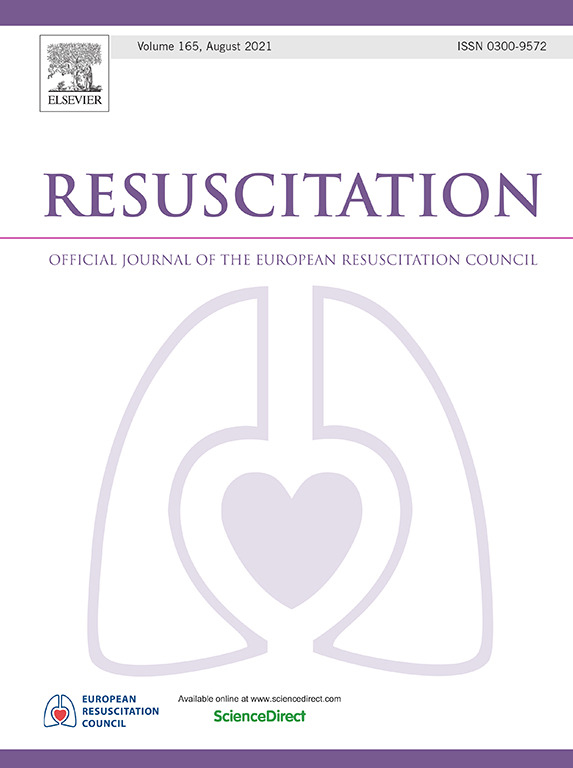Delayed neurological recovery in patients after extracorporeal resuscitation compared to conventional resuscitation. Implications for outcome assessment after cardiac arrest
IF 4.6
1区 医学
Q1 CRITICAL CARE MEDICINE
引用次数: 0
Abstract
Introduction
Extracorporeal cardiopulmonary resuscitation (eCPR) is a rescue therapy for refractory cardiac arrest, with evidence suggesting improved outcomes when performed at experienced centres. Unlike conventional CPR (cCPR), eCPR patients often exhibit delayed recovery. Current guidelines recommend outcome assessment at 1 month or hospital discharge, potentially missing late neurological improvements. This study investigates longitudinal changes in neurological outcomes among eCPR and cCPR patients.
Methods
We conducted a single-centre, retrospective cohort study at the Cardiac Arrest Centre Vienna, including adult patients treated with eCPR or cCPR between January 2020 and May 2024. Patients who survived at least 1 month were analysed. The primary endpoint was the difference in the temporal change in favourable neurological outcome (Cerebral performance category, CPC 1–2) between 1 and 6 months in eCPR versus cCPR patients. Secondary endpoints included CPC distribution, survival rates, and patterns of delayed recovery.
Results
Of 912 included patients (209 eCPR, 703 cCPR), 435 were alive at 1 month. In eCPR patients (n = 63), favourable neurological outcome increased from 59 % at 1 month to 87 % at 6 months (p < 0.001), while in cCPR patients (n = 372), it increased from 81 % to 84 % (p = ns). This corresponded to a 29 % versus 3 % increase in patients with a favourable neurological outcome (p < 0.001). There was no change in neurological outcome between 6 and 12 months in either group. Overall, recovery in eCPR patients was prolonged compared to patients after successful resuscitation with cCPR.
Conclusion
Neurological outcomes in eCPR patients frequently continue to improve after 1 month after cardiac arrest. Future eCPR trials should therefore use outcome assessments beyond 1 month to fully capture recovery potential and patient-centred outcomes.
体外复苏与常规复苏后患者的延迟神经恢复。心脏骤停后结局评估的意义。
体外心肺复苏(eCPR)是难治性心脏骤停的一种抢救治疗方法,有证据表明在经验丰富的中心进行可改善预后。与传统CPR (cCPR)不同,eCPR患者通常表现为延迟恢复。目前的指南建议在1个月或出院时进行结果评估,可能忽略了晚期神经系统的改善。本研究探讨了eCPR和cCPR患者神经预后的纵向变化。方法:我们在维也纳心脏骤停中心进行了一项单中心、回顾性队列研究,包括2020年1月至2024年5月期间接受eCPR或cCPR治疗的成年患者。对存活至少1个月的患者进行分析。主要终点是eCPR与cCPR患者在1- 6个月间有利的神经预后(脑功能类别,CPC 1-2)的时间变化的差异。次要终点包括CPC分布、生存率和延迟恢复模式。结果:912例患者(eCPR 209例,cCPR 703例)中,435例患者在1个月时存活。在eCPR患者(n=63)中,良好的神经预后从1个月时的59%增加到6个月时的87%(结论:eCPR患者的神经预后通常在心脏骤停后1个月后继续改善。因此,未来的eCPR试验应使用1个月以上的结果评估,以充分捕捉恢复潜力和以患者为中心的结果。
本文章由计算机程序翻译,如有差异,请以英文原文为准。
求助全文
约1分钟内获得全文
求助全文
来源期刊

Resuscitation
医学-急救医学
CiteScore
12.00
自引率
18.50%
发文量
556
审稿时长
21 days
期刊介绍:
Resuscitation is a monthly international and interdisciplinary medical journal. The papers published deal with the aetiology, pathophysiology and prevention of cardiac arrest, resuscitation training, clinical resuscitation, and experimental resuscitation research, although papers relating to animal studies will be published only if they are of exceptional interest and related directly to clinical cardiopulmonary resuscitation. Papers relating to trauma are published occasionally but the majority of these concern traumatic cardiac arrest.
 求助内容:
求助内容: 应助结果提醒方式:
应助结果提醒方式:


